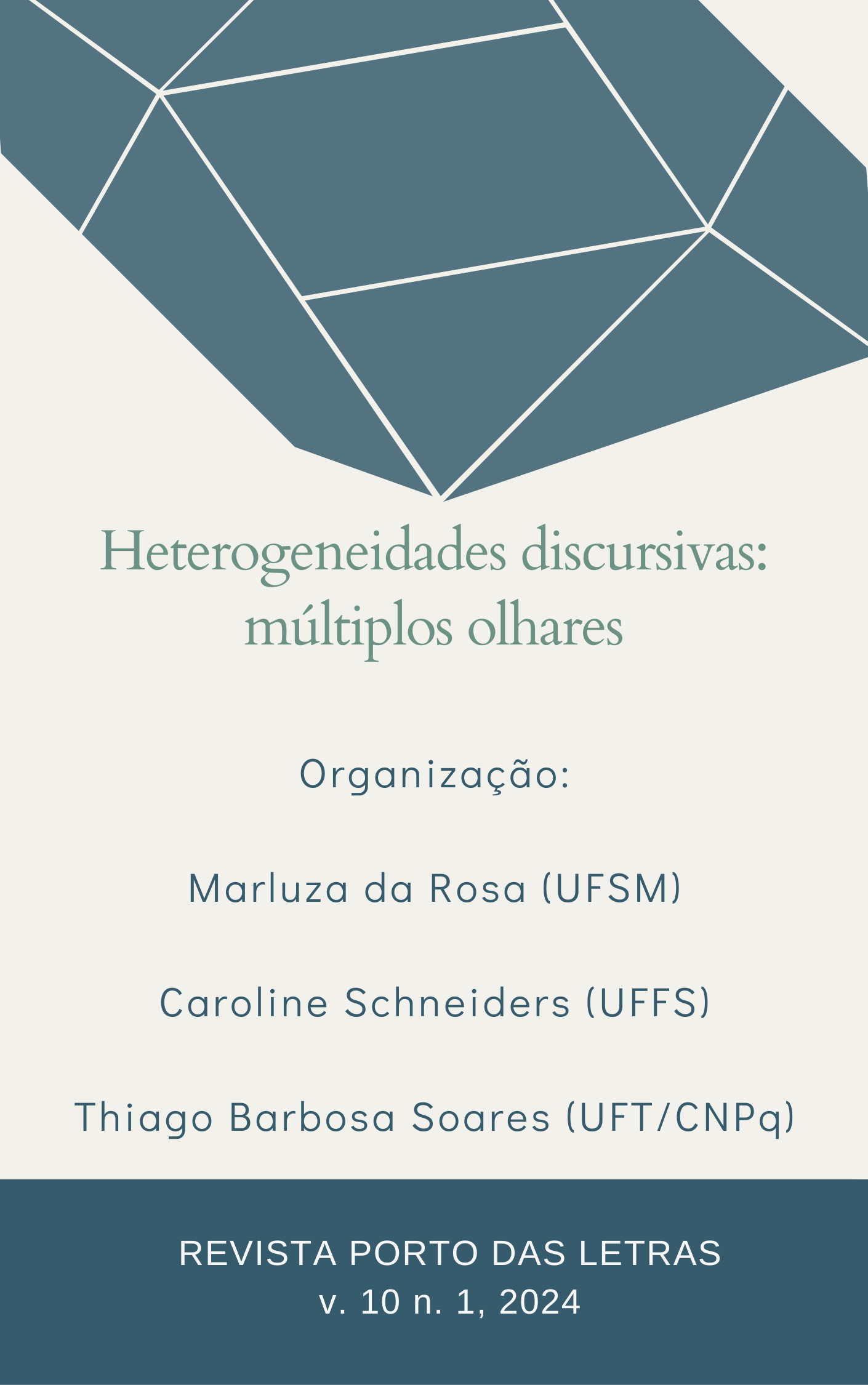PRODUÇÃO DE ESCRITA LITERÁRIA EM SALA DE AULA
UMA SEQUÊNCIA DIDÁTICA COM O GÊNERO CRÔNICA
DOI:
https://doi.org/10.20873/10.20873-2024-89-up87Resumo
Este artigo é o fruto de uma proposta pedagógica experimental e versa sobre a aplicação de uma Sequência Didática (SD) focada no gênero crônica, utilizando a abordagem da Escola Genebrina. O objetivo foi o de analisar o desenvolvimento das capacidades de leitura e escritados discentes envolvidos na produção do gênero, especificamente com estudantes do 7° ano do Ensino Fundamental Anos Finais numa escola pública da cidade de Boca da Mata - AL. Para tanto, adotamos um estudo de natureza qualitativa na análise do material coletado, embasando na Perspectiva Interacionista Sociodiscursiva (ISD) proposta por Bronckart (1999). Observou-se que, embora os estudantes apresentassem facilidade com a tipologia da narrativa, enfrentaram dificuldades de enquadrar seus textos na estrutura e características do gênero crônica. Assim como em usar uma linguagem conotativa, na utilização correta da paragrafação e, também, apresentaram desvios no que se refere ao tema proposto e ao sentido global do texto. No entanto, destacamos que a proposta de sequência didática ofertada favoreceu o desenvolvimento de habilidades de escrita e fomentou estratégias para escrita discentes, corroborando para o desenvolvimento de práticas de escrita literária com o gênero crônica.
Palavras-chave: Gênero crônica; Sequência Didática; Produção de escrita literária.
Referências
BAKHTIN, Mikhail. Estética da criação verbal. São Paulo: WMF Martins Fontes, 2003.
BRASIL. Ministério da Educação. Base Nacional Comum Curricular. Brasília: MEC, 2018. Disponível em: http://basenacionalcomum.mec.gov.br/. Acesso em: 19 de Agosto de 2023.
BRONCKART, Jean-Paul. Atividade de linguagem, textos e discursos: por um interacionismo sociodiscursivo. São Paulo: EDUC, 1999.
CAMPOS, Paulo Mendes et. al. Para gostar de ler: crônicas. São Paulo: Editora Ática, 1989. v.3.
CANDIDO, Antonio. Para gostar de ler: crônicas. São Paulo: Ática, 2003.
COELHO, Fábio André; Palomanes, Roza (org.). Ensino de produção textual. 1. ed. 2. reimp. São Paulo: Contexto, 2022.
DOLZ, Joaquim; SCHNEUWLY, Bernard. Os gêneros escolares - das práticas de linguagem a objetos de ensino. In: DOLZ, Joaquim; SCHNEUWLY, Bernard. Gêneros Orais e Escritos na escola. Campinas, SP: Mercado das Letras, 2004, p. 61-78.
FERNANDES, Alessandra. Compreensão e produção de textos em língua materna e língua estrangeira. Curitiba: Ibpex, 2008.
FURTADO, Alfredo Braga. Como escrever crônicas. Belém: abfurtado, 2020.
GOMES, Geam-K; MUNIZ, A. de O.; SOUZA, Sara de Oliveira Muniz de. As TDICS no campo de atuação social vida pública: uma sequência didática do gênero textual linha do tempo com o canva. Rev. Edu. Foco, Juiz de Fora, v. 26, n. esp. 3, 2002. Disponível em: https://bit.ly/3Ut3ZYI. Acesso em: 16 ago. 2023.
MACHADO, A. R.; CRISTOVÃO, V. L. L. A construção de modelos didáticos de gêneros: aportes e questionamentos para o ensino de gêneros. Linguagem em (Dis)curso, v. 6, n. 3, p. 547-573, 2006. Disponível em: http://www.educadores.diaadia.pr.gov.br/arquivos/File/pdf/construcao_modelos_didaticos_generos.pdf. Acesso em: 23 Ago. 2023.
MARCUSCHI, Luiz Antônio. Produção textual, análise de gêneros e compreensão. São Paulo: Parábola Editorial, 2008.
REZENDE, N. L. O ideal de formação pela literatura em conflito com as práticas de leitura contemporâneas. In: SANTINI, J. (org.). Literatura, crítica, leitura. Uberlândia: Edufu, 2011, p. 273-290.
SÁ, Jorge de. A crônica. Rio de Janeiro: Ática, 1987.
SOARES, Marcus Vinicius Nogueira. A crônica brasileira do século XIX: uma breve história. São Paulo: É Realizações, 2014.
Downloads
Publicado
Versões
- 2024-05-19 (2)
- 2024-05-19 (1)
Como Citar
Edição
Seção
Licença
Os autores concordam com os termos da Declaração de Direito Autoral, que se aplicará a esta submissão caso seja publicada nesta revista (comentários ao editor podem ser incluídos a seguir).

